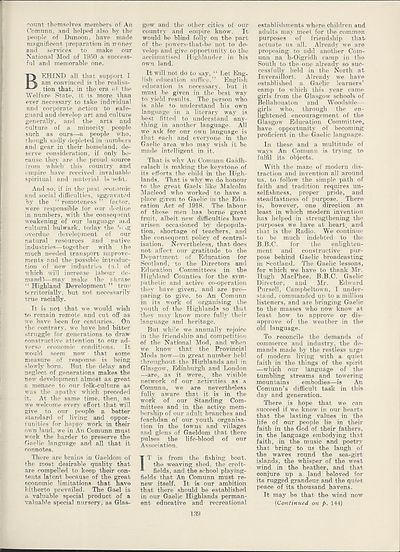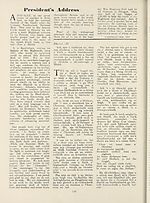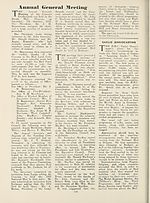An Comunn Gàidhealach Publications > Gaidheal > Volumes 44--45, January 1949--December 1950
(501) Page 139
Download files
Complete book:
Individual page:
Thumbnail gallery: Grid view | List view

r'Oimt themselves members of An
Cominm, and helped also by the
people of Dunoon, have made
magnificent jireparation in money
and services to make our
National Mod of 1950 a success¬
ful and memorable one.
EHIND all that support I
am convinced is the realisa¬
tion that, in the era of the
Welfare State, it is more than
ever necessary to take individual
and corporate {action to safe¬
guard and develop art and culture
generally, and the arts and
culture of a minority people
such as ours—a people vho,
though sadly depleted in numbers
and gear in their homeland, de¬
serve consideration, if only be¬
cause they are the proud source
from which this country and
empire have received invaluable
spiritual and material b< uefit.
And so, if in the past economic
and social difficulties, iggravoted
by the “ remoteness ” factor,
were responsible for our decline
in numbers, with the consequent
weakening of our language and
cultural bulwark, today the 'o ig
overdue development of our
natural resources and native
industries—together with fhe
much needed transport improve¬
ments and the possible introduc¬
tion of new industries (ad of
which will increase labour c!e-
mandl—may make the phrase
;t Highland Development ” true
territorially, but not necessarily
true racially.
It is not that we would wish
to remain remote and cut off as
we have been for centuries. On
the contrary, we have had bitter
struggle for generations to draw
constructive attention to our ad¬
verse economic conditions. It
would seem now that some
measure of response is being
slowly born. But the delay and
neglect of generations makes the
new development almost as great
a menace to our folk-culture as
was the apathy which preceded
it. At the same time, then, as
we welcome every effort that will
give to our people a better
standard of living and oppor¬
tunities for happy work in their
own land, we in An Comunn must
work the harder to preserve the
Gaelic language and all that it
connotes.
There are brains in Gaeldom of
the most desirable quality that
are compelled to keep their con¬
tents latent because of the great
economic limitations that have
hitherto prevailed. The Gael is
a valuable special product of a
valuable special nursery, as Glas¬
gow and the other cities of our
country and empire know. It
would be blind folly on the part
of the powers-that-be not to de¬
velop and give opportunity to the
acclimatised Highlander in his
own land.
It will not do to say, “ Let Eng¬
lish education suffice.” English
education is necessary, but it
must be given in the best way
to yield results. The person who
is able to understand his own
language in a literary way is
best fitted to understand any¬
thing in another language. All
we ask for our own language is
that each and everyone in the
Gaelic area who may wish it be
made intelligent in it.
That is why An Comunn Gaidh-
ealach is making the keystone of
its efforts the child in the High¬
lands. That is why we do honour
to the great Gaels like Malcolm
Macleod who worked to have a
place given to Gaelic in the Edu¬
cation Act of 1918. The labour
of these men has borne great
fruit, albeit new difficulties have
arisen occasioned by depopula¬
tion, shortage of teachers, and
the consequent policy of central¬
isation. Nevertheless, that does
not affect our gratitude to the
Department of Education for
Scotland, to the Directors and
Education Committees in the
Highland Counties for the sym¬
pathetic and active co-operation
they have given, and are pre¬
paring to give, to An Comunn
in its work of organising the
youth of the Highlands so that
they may know more fully their
language and heritage.
But while we annually rejoice
in the friendship and competition
of the National Mod, and when
we know that the Provincial
Mods now—in great number held
throughout the Highlands and in
Glasgow, Edinburgh and London
—are, as it were,, the visible
network of our activities as a
Comunn, we are nevertheless
fully aware that it is in the
work of our Standing Com¬
mittees and in the activ.e mem¬
bership of our adult branches and
feachdan of our youth organisa¬
tion in the towns and villages
and glens of Gaeldom that there
pulses the life-blood of our
Association.
IT is from the fishing boat,
the weaving shed, the croft-
fields, and the school playing-
fields that An Comunn must re¬
new itself. It is our ambition
that there should be established
in our Gaelic Highlands perman¬
ent educative and recreational
establishments where children and
adults may meet for the common
purposes of friendship that
actuate us all. Already we are
proposing to add another Com¬
unn na h-Oigridh camp in the
South to the one already so suc¬
cessfully held in the North at
Inveraillort. Already we have
established a Gaelic learners’
camp to which this year came
girls from the Glasgow schools of
Bellahouston and Wood side—-
girls who, through the en¬
lightened encouragement of the
Glasgow Education Committee,
have opportunity of becoming
proficient in the Gaelic language.
In these and a multitude of
ways An Comunn is trying to
fulfil its objects.
With the maze of modern dis¬
traction and invention all around
us, to follow the simple path of
faith and tradition requires un¬
selfishness, proper pride, and
steadfastness of purpose. There
is, however, one direction at
least in which modern invention
has helped in strengthening the
purposes we have at heart, and
that is the Radio. We continue
to be much indebted to the
B.B.C. for the enlighten¬
ment and constructive pur¬
pose behind Gaelic broadcasting
in Scotland. The Gaelic lessons,
for which we have to thank Mr.
Hugh MacPhee, B.B.C. Gaelic
Director, and Mr. Edward
Pursell, Campbeltown, I under¬
stand, commanded up to a million
listeners, and are bringing Gaelic
to the masses who now know at
least how to approve or dis¬
approve of the weather in the
old language.
To reconcile the demands of
commerce and industry, the de¬
mands made by the restless urge
of modern living with a quiet
faith in the things of the spirit
—which our language of the
tumbling streams and towering
mountains embodies—is An
Comunn’s difficult task in this
day and generation.
There is hope that we can
succeed if we know in our hearts
that the lasting values in the
life of our people lie in their
faith in the God of their fathers,
in the language embodying that
faith, in the music and poetry
that bring to us the laugh of
the waves round the sea-girt
islands, the whisper of the west
wind in the heather, and that
conjure up a land beloved for
its rugged grandeur and the quiet
peace of its thousand havens.
It may be that the wind now
(Continued on p. 144)
139
Cominm, and helped also by the
people of Dunoon, have made
magnificent jireparation in money
and services to make our
National Mod of 1950 a success¬
ful and memorable one.
EHIND all that support I
am convinced is the realisa¬
tion that, in the era of the
Welfare State, it is more than
ever necessary to take individual
and corporate {action to safe¬
guard and develop art and culture
generally, and the arts and
culture of a minority people
such as ours—a people vho,
though sadly depleted in numbers
and gear in their homeland, de¬
serve consideration, if only be¬
cause they are the proud source
from which this country and
empire have received invaluable
spiritual and material b< uefit.
And so, if in the past economic
and social difficulties, iggravoted
by the “ remoteness ” factor,
were responsible for our decline
in numbers, with the consequent
weakening of our language and
cultural bulwark, today the 'o ig
overdue development of our
natural resources and native
industries—together with fhe
much needed transport improve¬
ments and the possible introduc¬
tion of new industries (ad of
which will increase labour c!e-
mandl—may make the phrase
;t Highland Development ” true
territorially, but not necessarily
true racially.
It is not that we would wish
to remain remote and cut off as
we have been for centuries. On
the contrary, we have had bitter
struggle for generations to draw
constructive attention to our ad¬
verse economic conditions. It
would seem now that some
measure of response is being
slowly born. But the delay and
neglect of generations makes the
new development almost as great
a menace to our folk-culture as
was the apathy which preceded
it. At the same time, then, as
we welcome every effort that will
give to our people a better
standard of living and oppor¬
tunities for happy work in their
own land, we in An Comunn must
work the harder to preserve the
Gaelic language and all that it
connotes.
There are brains in Gaeldom of
the most desirable quality that
are compelled to keep their con¬
tents latent because of the great
economic limitations that have
hitherto prevailed. The Gael is
a valuable special product of a
valuable special nursery, as Glas¬
gow and the other cities of our
country and empire know. It
would be blind folly on the part
of the powers-that-be not to de¬
velop and give opportunity to the
acclimatised Highlander in his
own land.
It will not do to say, “ Let Eng¬
lish education suffice.” English
education is necessary, but it
must be given in the best way
to yield results. The person who
is able to understand his own
language in a literary way is
best fitted to understand any¬
thing in another language. All
we ask for our own language is
that each and everyone in the
Gaelic area who may wish it be
made intelligent in it.
That is why An Comunn Gaidh-
ealach is making the keystone of
its efforts the child in the High¬
lands. That is why we do honour
to the great Gaels like Malcolm
Macleod who worked to have a
place given to Gaelic in the Edu¬
cation Act of 1918. The labour
of these men has borne great
fruit, albeit new difficulties have
arisen occasioned by depopula¬
tion, shortage of teachers, and
the consequent policy of central¬
isation. Nevertheless, that does
not affect our gratitude to the
Department of Education for
Scotland, to the Directors and
Education Committees in the
Highland Counties for the sym¬
pathetic and active co-operation
they have given, and are pre¬
paring to give, to An Comunn
in its work of organising the
youth of the Highlands so that
they may know more fully their
language and heritage.
But while we annually rejoice
in the friendship and competition
of the National Mod, and when
we know that the Provincial
Mods now—in great number held
throughout the Highlands and in
Glasgow, Edinburgh and London
—are, as it were,, the visible
network of our activities as a
Comunn, we are nevertheless
fully aware that it is in the
work of our Standing Com¬
mittees and in the activ.e mem¬
bership of our adult branches and
feachdan of our youth organisa¬
tion in the towns and villages
and glens of Gaeldom that there
pulses the life-blood of our
Association.
IT is from the fishing boat,
the weaving shed, the croft-
fields, and the school playing-
fields that An Comunn must re¬
new itself. It is our ambition
that there should be established
in our Gaelic Highlands perman¬
ent educative and recreational
establishments where children and
adults may meet for the common
purposes of friendship that
actuate us all. Already we are
proposing to add another Com¬
unn na h-Oigridh camp in the
South to the one already so suc¬
cessfully held in the North at
Inveraillort. Already we have
established a Gaelic learners’
camp to which this year came
girls from the Glasgow schools of
Bellahouston and Wood side—-
girls who, through the en¬
lightened encouragement of the
Glasgow Education Committee,
have opportunity of becoming
proficient in the Gaelic language.
In these and a multitude of
ways An Comunn is trying to
fulfil its objects.
With the maze of modern dis¬
traction and invention all around
us, to follow the simple path of
faith and tradition requires un¬
selfishness, proper pride, and
steadfastness of purpose. There
is, however, one direction at
least in which modern invention
has helped in strengthening the
purposes we have at heart, and
that is the Radio. We continue
to be much indebted to the
B.B.C. for the enlighten¬
ment and constructive pur¬
pose behind Gaelic broadcasting
in Scotland. The Gaelic lessons,
for which we have to thank Mr.
Hugh MacPhee, B.B.C. Gaelic
Director, and Mr. Edward
Pursell, Campbeltown, I under¬
stand, commanded up to a million
listeners, and are bringing Gaelic
to the masses who now know at
least how to approve or dis¬
approve of the weather in the
old language.
To reconcile the demands of
commerce and industry, the de¬
mands made by the restless urge
of modern living with a quiet
faith in the things of the spirit
—which our language of the
tumbling streams and towering
mountains embodies—is An
Comunn’s difficult task in this
day and generation.
There is hope that we can
succeed if we know in our hearts
that the lasting values in the
life of our people lie in their
faith in the God of their fathers,
in the language embodying that
faith, in the music and poetry
that bring to us the laugh of
the waves round the sea-girt
islands, the whisper of the west
wind in the heather, and that
conjure up a land beloved for
its rugged grandeur and the quiet
peace of its thousand havens.
It may be that the wind now
(Continued on p. 144)
139
Set display mode to:
![]() Universal Viewer |
Universal Viewer | ![]() Mirador |
Large image | Transcription
Mirador |
Large image | Transcription
| An Comunn Gàidhealach > An Comunn Gàidhealach Publications > Gaidheal > Volumes 44--45, January 1949--December 1950 > (501) Page 139 |
|---|
| Permanent URL | https://digital.nls.uk/127128048 |
|---|
| Description | This contains items published by An Comunn, which are not specifically Mòd-related. It includes journals, annual reports and corporate documents, policy statements, educational resources and published plays and literature. It is arranged alphabetically by title. |
|---|
| Description | A collection of over 400 items published by An Comunn Gàidhealach, the organisation which promotes Gaelic language and culture and organises the Royal National Mòd. Dating from 1891 up to the present day, the collection includes journals and newspapers, annual reports, educational materials, national Mòd programmes, published Mòd literature and music. |
|---|---|
| Additional NLS resources: |
|

